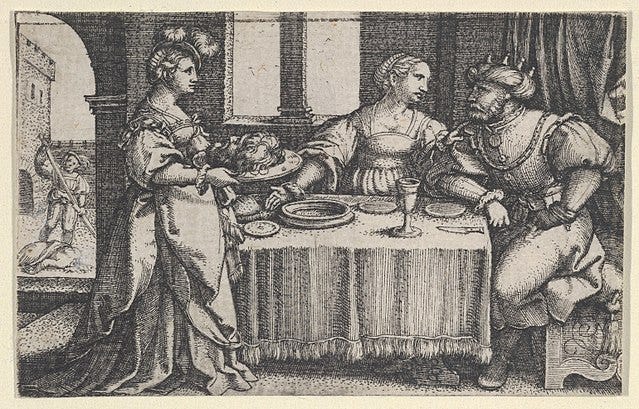John the Baptist and the Effeminate Herods of Today
Commentary
When John the Baptist was thrown into prison, he heard of the words and deeds of Jesus and sent his own followers to question whether He was “the one who is to come.” After telling John’s disciples to bring to John the report of their own eyes, Our Lord then testified to John’s greatness as a prophet:
And when [John’s disciples] went their way, Jesus began to say to the multitudes concerning John: What went you out into the desert to see? a reed shaken with the wind? But what went you out to see? a man clothed in soft garments? Behold they that are clothed in soft garments, are in the houses of kings. But what went you out to see? a prophet? yea I tell you, and more than a prophet.
Matthew 11:7-9
John was neither a man dressed in soft clothes, nor a reed swayed by the wind, nor did he sit in the house of kings. He dressed in camel skin and lived in the desert, caring neither for the comforts of the world nor the praise of the men. But Herod Antiphas, Tetrarch of Galilee, cared too much for both of those things.
Herod lived in a palace, dressed in soft clothes, and was shaken by every wind that blew, including the winds of public opinion and of his own illicit lusts. He was, therefore, a soft man, an effeminate man. He took his brother’s wife, and when John the Baptist told Herod that his action was unlawful, Herod threw John in prison. When that wife, Herodias, grew angry with John and wanted his head, she took advantage of another of Herod’s lusts: his lust for her daughter Salome.
Herod, as worldly men so often are, grew weary with his sins and wanted some distraction. He called for a dance from Salome to distract his mind. She threw herself into a sensuous dance that stirred Herod’s lusts to a new level. At the end of the dance, Herod, roused by drink and the dance, unthinkingly promised Salome anything she wished. At her mother’s urging, she asked for the head of her mother’s enemy on a platter. Herod was shocked, but a man so easily blown by the winds of his own lusts was easily blown too by public opinion. He feared embarrassment before his guests if he did not keep the oath. And so John the Baptist, who would not bend, lost his head.
1200 years after Our Lord, St. Thomas Aquinas spoke also of men like Herod. As a soft man, a reed, Herod was an effeminate man. An effeminate man, according to Thomas, was a soft man, one who “readily yields to the touch.” He was “ready to forsake a good on account of difficulties which he cannot endure.” Herod was such a man, a man dressed in soft clothes and, in the words of Shakespeare, the clothes proclaimed the man. And the effeminate man, Herod, could not stand a real one, John. The real man had to die.
The world today wants Herods: weak, effeminate men who yield to the touch. Men who are reeds swaying in the winds of public opinion. It rewards them; such men sit in the house of kings and follow the spirit of the world. They wear soft clothes and have soft convictions. They don’t ask hard questions; they follow the prevailing winds and float along with the stream. They don’t defend things worth defending and are not willing to bear any risk or trouble in service to the truth. They seek the “cheap grace” that calls for no stand and no sacrifice.
Such men use preferred pronouns (and probably state their own pronouns) and define marriage and sexuality according to the prevailing winds of the world. Such men are terrified of the responsibilities of marriage (hence marriage rates are at historic lows). They avoid the responsibilities of both marriage and children, cheerfully supporting contraception and abortion—the better to avoid the need to act like a grown man. They nicely proclaim abortion should be a woman’s choice because they lack the conviction to defend the innocent lives of the unborn. Like Herod seeking distraction from Salome, they seek distraction from their own ennui and weakness in drugs, pornography, and other desires of the flesh. These men are silent when they ought to speak and speak when they ought to remain silent, fearing the approbation of man rather than the wrath of God. Such men are hardly men at all.
The world wants men like Herod and will, if it can, behead men like John. It will not tolerate firm men, men who will be firm against the spirit of the world. Such men will not yield to the touch and will endure any difficulty or sacrifice for the goods they are called to defend and live out. They will refuse to call evil good and good evil. They will neither use preferred pronouns, nor pretend that marriage can be anything other than God has ordained it to be. They will tell the truth, at whatever cost to themselves.
In a world that wants us to be soft, like Herod, we all, and men in particular, are called to be firm like John that Baptist. The temptation to be like Herod is ever present. But, when we are tempted by desire, position, or recognition, we must remember John the Baptist who lived in the desert. When we are tempted too much by the pleasures and comforts of life, we must remember the man who wore camel hair and ate locusts. And when we face the winds of public opinion, we remember the man who would not sway with the wind, and who lost his head for it.
St. John the Baptist, Pray for Us.



